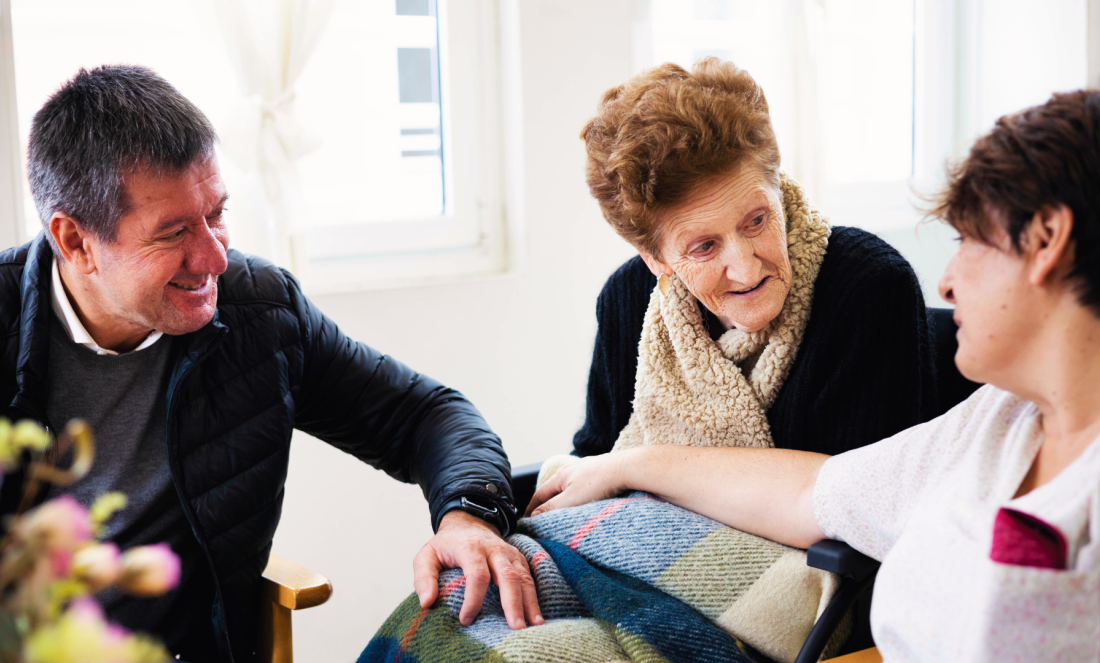
Validation: the art of making sense of care
For some time in Matia we have been working in an area that we consider of special interest in the house when it comes to advancing in the transformation of care. We are talking about validation, a methodology that seeks to restore the dignity and self-esteem of people with dementia, through a new look at what it means to be with them, to communicate, to understand their needs... An approach that we have been doing together with Vincore Cooperative, and professional experts, such as Javier Irujo.
After the news of the recent death of Naomi Feil, promoter of this therapy, we thought it would be interesting to bring you some ideas and reflections on this methodology, which we have tried to capture in this interview with Javier. We hope you find it interesting.
Q.- Hello Javier. Could you tell us how you landed in a field such as care for people with dementia. Where does the concern that leads you to devote yourself to improving the lives of these people come from?
J.I.- I came to this field by pure chance, when I found a job in a residence right after leaving the university. And contrary to what I expected, I loved it and I was completely caught. Upon discovering all those people with dementia I felt the need to be able to generate links with them, something that led me to very nice moments, but also to moments of great frustration and feeling lost and unprepared. Until, again by chance, I discovered the Validation Method and a whole new universe of wonderful bonds and relationships with these people opened up to me. That was when everything began to make much more sense and I was gladly trapped in this field.
Q.- Given the complexity that often accompanies the lives of people with dementia, there is a tendency to focus on aspects related to health or family finances, and not so much on the experience and point of view of the person himself. How do you think we can recover the voice of these people under the stigma attached to the word dementia.
J.I.- I think we need a change of perspective to begin with, since our way of relating to and treating these people with dementia derives from our way of seeing and considering them. We need to be able to see beyond the diagnosis, to see people who have needs and who, just as you and I do, express these needs through their behavior. That behavior, what they do and what they say, is their voice; and we will be unable to recover and listen to that voice as long as we continue to see them as people who behave that way because they are sick. As long as we continue to see their behavior as meaningless or as a disorder, we will continue to ignore the voices that are trying to tell us what is happening to them and what they need.
Moreover, as you rightly comment, we don't usually put the focus on their experience, when these are people who have been through a lot in their lives and who, therefore, have a lot of experience and many resources to deal with difficulties.
Q.- From your experience and as an expert on the subject, what aspects do you think we neglect when communicating with these people? What would it take to connect with them and what can validation bring us?
J.I.- Uffff.... There are many things we need to take into account to take care of communication and connection with the person with dementia. If I had to choose two things, for the sake of brevity, it would be presence and our positioning. When I am in front of any person, something that is going to completely condition the relationship is my presence. Am I present here and now to connect with you, am I available to you, to welcome what you are trying to communicate, or am I more focused on my needs, such as my need for the person to be calm? We need to create spaces for caregivers to become aware of the power of our presence and availability.
As I mentioned, my positioning in the relationship will also have a strong impact on the connection. That is, how I position myself in relation to the other person, am I really willing to create a relationship of equals in which I accompany what you express and your emotions, or do I position myself as the person who knows what you need and constantly try to redirect you towards what I think you need to be?
Q.- In advanced stages of dementia, communication becomes more complicated. It is usually at this point in the process when it is more common to think that the person we knew is no longer there. That “he/she is no longer aware of it”, which definitively sets the person aside, and declares him/herself incapable of knowing what leads him/her to certain “inappropriate behaviors”. Can we remake a saying and say that, “a good observer, a few words or a look is enough”?
J.I.- I don't know if we can redo the saying or not, but certainly the observation and the look are going to have a brutal weight in the bond and the connection that we try to create. Even the look from two different perspectives: the importance of the look or eye contact with the person, and the importance of reevaluating how I look at (consider) the person, which is what I was telling you before. If when I look at the person, I see “inappropriate behaviors” is when I am going to try to redirect him/her, to make behavioral management...
If when I look at him I see behaviors that make sense, I will accompany what he expresses. And that will have an effect on how he feels. So I don't know if a glance is enough, but a change of glance can change so many things...
Q.- Feelings such as guilt, exhaustion, sadness, irritability... seem to be part of the usual experience of care. Can we redirect these emotions from a change of focus in our way of understanding what is happening to the person and put ourselves in their shoes? Does validating or valuing play in favor of the person we are accompanying and also of the one we are accompanying?
J.I.- I think it is essential that we understand that all emotions are necessary, valuable and meaningful. Those of people with dementia and those of the people we care for. So, as my emotions and feelings, when I care also have meaning and value, rather than redirect them, I advocate recognizing and welcoming them. Give them space. Listen to me and take care of me. Because that guilt and sadness that I am feeling come from somewhere, they arise for a reason.
Self-care for caregivers is indispensable, and this means giving ourselves the right to feel what we feel. If before connecting with the person with dementia, I listen to myself and become aware of the emotions that accompany me, I will be able to welcome and manage them and come to the relationship with much more availability. Remember the presence that I spoke of at the beginning? I will be able to be much more present in the relationship if I have previously listened, welcomed and taken care of what happens to me. And thus create a bond in which the sense of emotions of both people is recognized. Those of the person with dementia and mine. If I have learned anything from Validation, it is to realize that there is meaning everywhere.
Q.- And to conclude, to dream, how do you see the future of care for people with dementia?
J.I.- I would love that in the future there will be care full of real presence, listening, warmth, human quality and a lot of love for people. I would love to find that the people we care for have fully integrated that what the person with dementia explains, feels, does and expresses makes sense. And that we are able to see beyond the pathologizing look that permeates everything today. When we are able to see the meaning behind everything, is when care takes on more value and meaning.

Author

Add new comment